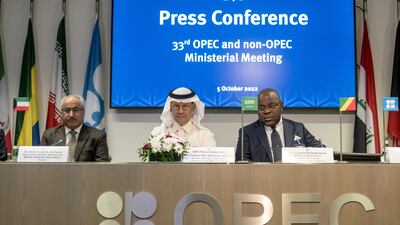Oil prices climbed after the Opec+ alliance agreed to reduce output by 2 million barrels per day, its biggest production cut since the start of the coronavirus pandemic in 2020, as it vies to boost the energy market amid a global economic slowdown that is weighing on fuel demand.
Brent, the benchmark for two thirds of the world’s oil, was up 0.72 per cent at $94.04 a barrel at 8.10pm UAE time yesterday. West Texas Intermediate, the gauge that tracks US crude, was trading 0.62 per cent higher at $88.30 a barrel.
After registering their worst quarter in two years last month, oil prices gained more than 10 per cent over the past week in the run-up to the first in-person meeting of the 23-member supergroup of crude producers in Vienna since March 2020.
The rally was largely driven by media reports that signalled a large production cut was on the table.
The US Energy Information Administration weekly report, which was released on Wednesday, also fed into the rally as it showed that American crude stocks fell by 1.4 million barrels in the week ended September 30.
Opec+ said at the meeting that its decision was made in “light of the uncertainty that surrounds the global economic and oil market outlooks, and the need to enhance the long-term guidance for the oil market, and in line with the successful approach of being proactive and pre-emptive”.
Given that many producers within Opec+ have been unable to meet their targets, the new output cut is higher than many members’ current production levels, with a 2 million bpd reduction expected to end up being closer to 1 million bpd in terms of actual cuts to output, Emirates NBD economists said on Thursday.
Saudi Arabia and Russia will bear the brunt of the cuts, with their targets reduced by 526,000 bpd respectively, accounting for more than half the total cuts.
In a research note after the Opec+ decision, UBS strategists Giovanni Staunovo and Wayne Gordon said they continued to hold a positive outlook for oil prices.
“With oil demand benefitting from gas-to-oil switching this winter, the likely end of OECD [Organisation for Economic Co-operation and Development] releases of strategic oil reserves and the European ban on waterborne Russian crude imports coming into force on December 5 amid lower Opec+ crude production, we expect the oil market to tighten further,” they said.
UBS expects Brent to move above the $100 a barrel level over the coming quarters.
Rystad Energy's senior vice president Jorge Leon said even if Opec+ cuts are executed at a 60 per cent level, they would "push inventory draws into bullish territory".
"We believe that the price impact of the announced measures will be significant. By December this year Brent would reach over $100 per barrel, up from our earlier call for $89 per barrel."
At the meeting on Wednesday, oil producers decided to extend their alliance until December 31, 2023 instead of the end of this year.
While ministerial meetings will now take place every six months instead of monthly, the group said it could call an extraordinary meeting if market conditions justify it.
“We will make sure that we have a balanced market and if we have to do more, we will do more … We are looking at [the] long term,” Suhail Al Mazrouei, UAE Minister of Energy and Infrastructure, said at the post-meeting press conference.
“What is important to us is bringing the investment [and] the sustainability of this market.”
Ehsan Khoman, director of emerging markets research for Europe, the Middle East and Africa at MUFG Bank, said while Opec's cut was exceptional, it was “also logical as it maximises the group’s revenue today with minimal sacrifice of future profitability”.
Opec+ is "here to stay as a moderating force to bring about stability", Saudi Arabia’s Energy Minister Prince Abdulaziz bin Salman said on Wednesday.
“Energy is something that can never be attended to in short-term tweaks and moves … the world energy markets need attendance, careful planning and investments.”
The White House said US President Joe Biden was “disappointed” by the Opec+ decision.


